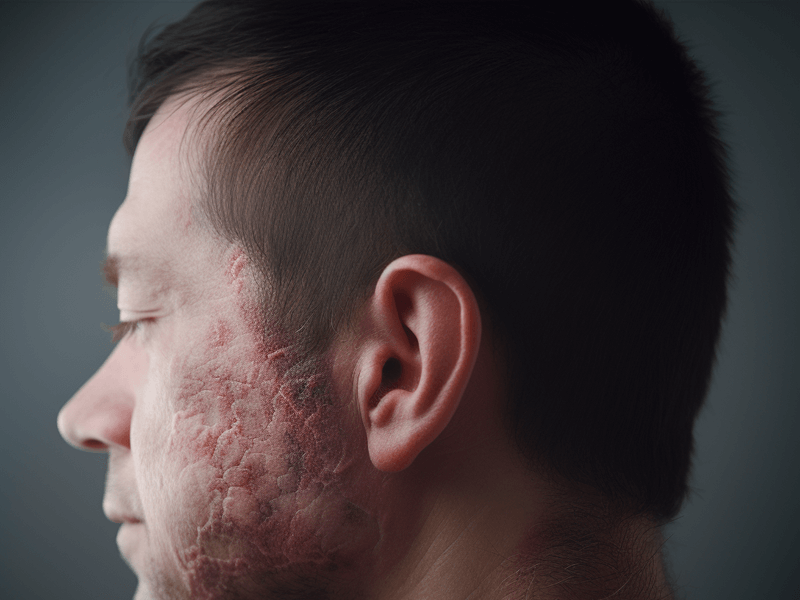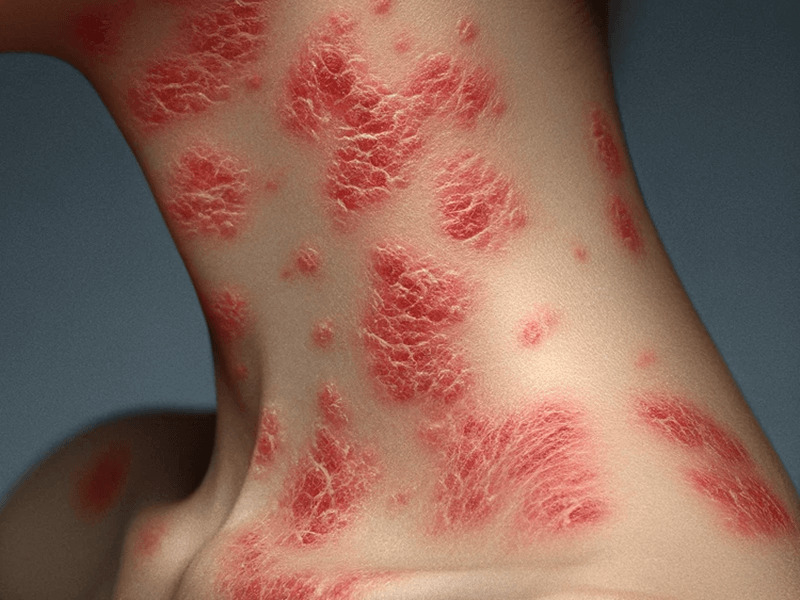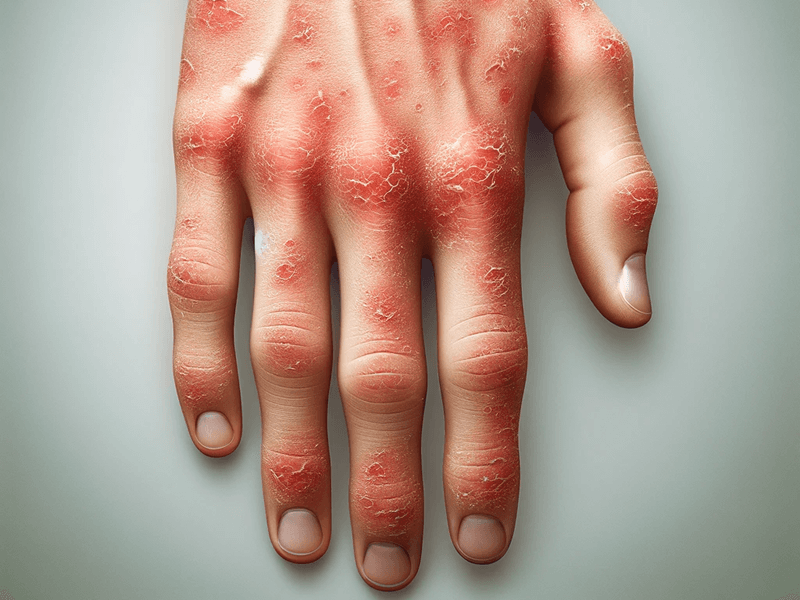If you’ve ever experienced itchy, scaly skin or have seen someone dealing with such a condition, you may wonder whether it’s psoriasis or eczema. These two dermatological conditions, while different, can share some similarities, leading to confusion. In this comprehensive guide, we will tell you the difference between eczema and psoriasis, their symptoms, causes, and therapy options. By the end of this article, you’ll have a clear understanding of these skin conditions and be better equipped to manage them.
Content Index
ToggleEczema and Psoriasis: What Are They?
Psoriasis and Eczema are both chronic dermatological conditions that can cause discomfort and affect your quality of life. While they may share some symptoms, they have distinct characteristics.
Eczema, also known as atopic dermatitis, is a common skin condition that often starts in childhood. It is characterized by red, itchy rashes that can appear on various parts of the body, including the face, arms, and legs. Eczema typically tends to be triggered by allergens or irritants and can worsen with stress.
Psoriasis is a chronic autoimmune disease that primarily affects the skin. It is characterized by the rapid overproduction of skin cells, leading to the formation of scaly plaques. Psoriasis can occur on the scalp, elbows, knees, and other areas of the body. Unlike eczema, psoriasis is not triggered by allergens and has a genetic component.
Similar Symptoms of Eczema and Psoriasis: How Psoriasis vs Eczema Feel
Eczema and psoriasis, though distinct conditions, share certain commonalities that can sometimes make them challenging to differentiate. In this comprehensive guide, we’ll delve into the similarities and differences between psoriasis and eczema, shedding light on how they manifest and the nuances that set them apart. By exploring the symptoms of eczema and psoriasis, you’ll gain a better understanding of these chronic skin conditions and how to distinguish between them effectively.
Symptoms of Eczema:
- Red, inflamed skin
- Intense itching
- Dry, scaly patches
- Cracked or weeping skin
- Swelling and sensitivity
Symptoms of Psoriasis:
- Thick, raised, and scaly plaques
- Silvery scales on the skin
- Redness and inflammation
- Itching or burning sensation
- Nail changes (pitting or thickening)

What Causes Eczema and Psoriasis
Eczema and psoriasis, both chronic dermatological conditions, can be a source of discomfort and concern for many individuals. Differentiating between these two common ailments is essential for effective management and treatment. In this comprehensive guide, we will delve into the causes of eczema and psoriasis, highlighting the key differences, and exploring the various therapy options available. By gaining a deeper understanding of these conditions, you can make informed choices to manage and alleviate their symptoms effectively.
Cause of Eczema:
- Genetic predisposition
- Environmental factors (allergens, irritants)
- Abnormal immune system response
Causes of Psoriasis:
- Genetic factors (family history)
- Immune system dysfunction (autoimmune)
- Environmental triggers (infections, stress)
Diagnosing Psoriasis and Eczema
To differentiate between eczema and psoriasis, a dermatologist will conduct a thorough examination, review your medical history, and occasionally perform skin tests or biopsies. Achieving an accurate diagnosis is crucial for formulating an effective treatment plan for these chronic skin conditions.
Psoriasis and eczema are two common chronic dermatological conditions that share similarities in symptoms, making it essential to distinguish between them. While both conditions can cause dry, itchy skin, and affect individuals differently, a proper diagnosis is crucial. Psoriasis usually is characterized by scaly skin plaques, and it is an autoimmune disease. On the other hand, eczema, also known as atopic dermatitis, tends to result in itchy, inflamed skin.
The National Psoriasis Foundation and the National Eczema Association can provide valuable resources and information on the respective conditions, aiding in better understanding and management. Identifying the precise cause of eczema and psoriasis can sometimes be challenging, but with the expertise of a dermatologist, it becomes easier to create a personalized treatment plan tailored to your specific needs.
In summary, while eczema and psoriasis may exhibit similar symptoms, their differences are significant. Seeking professional guidance and diagnosis is the first step towards effective management, allowing you to address either eczema or psoriasis with appropriate therapy options and good skin care practices.
How to Treat Eczema and Psoriasis
When dealing with eczema or psoriasis, effective treatment strategies are essential, tailored to the specific needs and severity of the condition. Here’s a breakdown of treatment options for each:
Eczema treatment:
- Moisturizers: Keeping the skin adequately hydrated is a fundamental step in managing eczema. Regular use of moisturizers helps prevent dryness and itching.
- Topical Corticosteroids: For reducing inflammation and relieving itching, dermatologists often prescribe topical corticosteroid creams or ointments.
- Antihistamines: Over-the-counter or prescription antihistamines can help alleviate the itchiness associated with eczema, allowing for better comfort.
- Immunomodulators: In severe cases of eczema, immunomodulator medications may be recommended. These drugs work to modify the immune response that triggers eczema symptoms.
Treatment for Psoriasis:
- Topical Treatments: Psoriasis can often be managed with topical treatments such as corticosteroids and vitamin D analogs. These creams or ointments help to reduce inflammation and slow down the excessive skin cell growth characteristic of psoriasis.
- Phototherapy: In phototherapy, patients are exposed to controlled amounts of UV light, which can help to slow down skin cell turnover and reduce psoriasis symptoms.
- Systemic Medications: For severe cases of psoriasis, dermatologists may prescribe systemic medications, which are taken orally or by injection. These medications work throughout the body to suppress the immune response that drives psoriasis.
- Biologic Drugs: Biologic drugs target specific components of the immune system responsible for psoriasis. They have shown remarkable effectiveness in managing severe psoriasis.
Understanding the available treatment options for eczema and psoriasis is crucial in developing an effective treatment plan. Both conditions are chronic and can significantly impact one’s quality of life, but with the right approach, individuals can find relief and maintain good skin health.

Managing Eczema and Psoriasis Flare-ups
Both of them are skin conditions characterized by periods of flare-ups and remission. It’s crucial to understand how to manage these conditions effectively, especially when dealing with symptoms like itchy skin, dryness, and scaly patches. Recognizing the differences between those two conditions, identifying potential triggers, and establishing a tailored treatment plan can make a significant difference in your skin health. Explore the commonalities and distinctions between these conditions and learn how to maintain good skin care practices for lasting relief.
Living with Eczema: Tips for Daily Care
If you or a loved one is dealing with eczema, navigating daily care can make a significant difference in managing this skin condition. Here are some practical tips to help you cope with eczema effectively:
Gentle Skincare: Opt for mild, fragrance-free skincare products to minimize skin irritation and reduce the risk of flare-ups.
Moisturize Regularly: Keeping your skin well-hydrated with a suitable emollient or moisturizer is crucial. Moisturizing helps in maintaining the skin’s barrier function and preventing dryness.
Identify Triggers: Pay attention to potential triggers like certain foods, fabrics, or environmental factors that may exacerbate your eczema. Identifying and avoiding these triggers can be a game-changer.
Stress Management: Stress is known to worsen eczema symptoms. Implement stress-reduction techniques such as meditation, yoga, or deep breathing exercises to help manage stress and reduce its impact on your skin.
Living with Psoriasis: Coping Strategies
Living with psoriasis can be challenging, but there are strategies and techniques to help you cope effectively with this skin condition:
Educate Yourself: Take the time to educate yourself about psoriasis, including its types, symptoms, and available treatments. Knowledge empowers you to make informed decisions about your care.
Seek Emotional Support: Joining a support group or seeking therapy can provide valuable emotional support. Sharing experiences and insights with others who understand can make a significant difference in managing the emotional aspects of psoriasis.
Adherence to Treatment: Follow your prescribed treatment plan consistently. Consistency is key in managing psoriasis effectively and preventing flare-ups.
Open Communication: Don’t hesitate to discuss your concerns, questions, or treatment options with your healthcare provider. Maintaining open communication ensures that you receive the best care tailored to your needs.
Eczema or Psoriasis? Difference Between Eczema and Psoriasis
To effectively manage these chronic skin conditions, it’s essential to discern the key distinctions between eczema and psoriasis.
Eczema often occurring differences:
- Typically initiates in childhood
- Triggers include allergens and irritants
- Manifests as red, itchy rashes
- Often associated with atopic dermatitis
- Has a genetic predisposition
Psoriasis often occurring differences:
- Primarily affects adults
- Classified as an autoimmune disease
- Presents as thick, scaly plaques
- Exhibits silvery scales
- Involves both genetic and immune system factors
Conclusion: Psoriasis and Eczema Feel Different
In conclusion, eczema and psoriasis are two common but distinct dermatological conditions. While they may share some symptoms, their causes, treatments, and management strategies differ. If you or someone you know is dealing with either of these conditions, seeking medical advice and following a tailored treatment plan is essential for maintaining healthy skin.
Key Takeaways:
- Eczema and psoriasis are chronic dermatological conditions that require proper management.
- Symptoms, causes, and triggers differ between the two conditions.
- Treatment options are available for both eczema and psoriasis.
- Living with these conditions may require lifestyle adjustments and emotional support.
Understanding the differences between eczema and psoriasis is the first step toward effective management and improved quality of life for those affected by these skin conditions.


